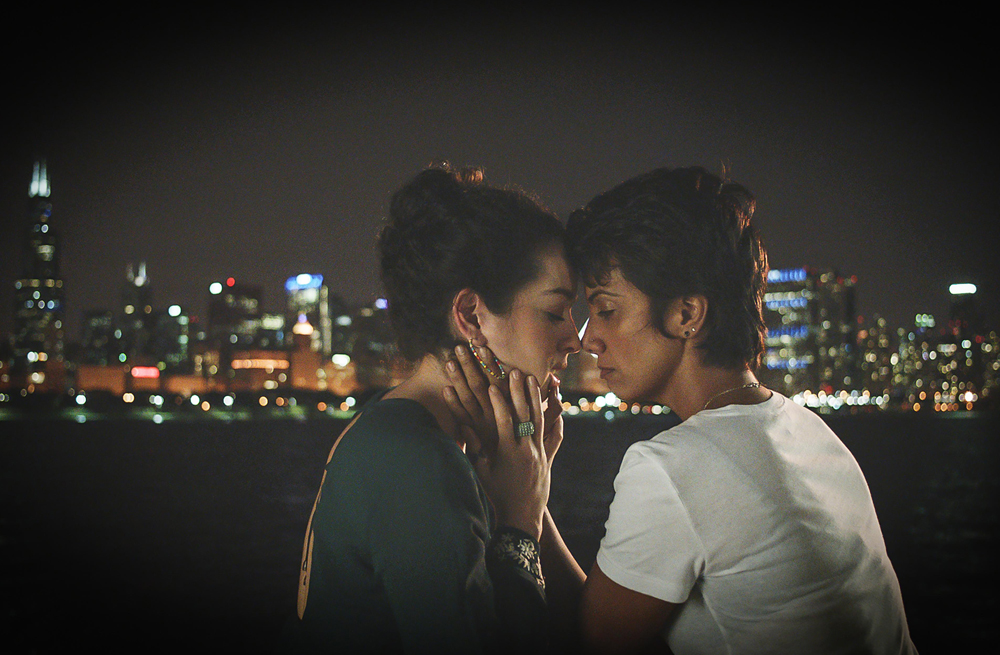Fawzia Mirza was making an appearance on the late night comedy talk show in Chicago when the idea hit her for “Signature Move,” or rather it hit the host of “Talk Hard” in the form of Lisa Marie Varon, the formed WWE wrestler known as Veronica. Mirza, the Pakistani-Canadian writer/actress/comedian, was performing her comic creation Kam Kardashian when she was joined on stage by Varon, who was quick to take control of the situation.
“She actually performed her signature move on the show,” Mirza says now, still a little awed by what happened next. “Her signature move was the moonsault and she looked at the host that she had laid down on the floor below her feet and looked down at him and said, ‘Don’t move or I’m going to get hurt. And I don’t want to get hurt.’ And at that moment, she does her move and I’m like oh my God, this woman is amazing. And it just made me think where are these women in our stories? I just felt like they were forgotten or lost and I wanted to remember them.”
“Signature Move” is about wrestling all right, but not the kind you think, at least for much of its duration. Mirza, who will stress she’s “a very 5’2”, 114 pound girl with not very many muscles, only on the top actually — I have muscles on the top of my biceps,” relies on a wildly strong mind instead for the story of Zaynab, a Muslim lesbian lawyer living in the Windy City who hasn’t yet opened up to her tradition-bound mother (Shabana Azmi), though the seriousness of a new relationship with a Latina named Alma (Sari Sanchez) is likely to force the issue. The situation poses an intriguing contradiction for Zaynab, who finds herself surprisingly comfortable culturally in Alma’s company more than with her mother, to whom she’s always been close, and while she grapples with the right way to pull her mom away from her beloved soap operas long enough to break the news to her, she eventually starts taking advantage of the Luchadora lessons offered by a client who can’t afford to pay her in cash to build up her resolve.
While Mirza’s clear personal touch brings soul and great humor to “Signature Move,” the comedy also marks the feature directorial debut of Jennifer Reeder, a filmmaker noted for her incisive coming-of-age shorts who continually draws on the richness of the cultural backgrounds of her two leads to make the film as electric as the sparks flying between Zaynab and Alma during the opening stages of their romance. Together, the filmmaking team comes through — and then some — on Mirza’s initial promise to herself to show women who have been all too commonly left out of the limelight, quite literally turning the kliegs towards them during a raucous finale in the wrestling ring, but also well before as you see dynamic portrayals of how past experience and heritage shape their decisions, putting a fresh spin on some of the romcom conventions “Signature Move” embraces.
In the midst of a busy week at SXSW, Mirza, Reeder and Sanchez took a moment to catch their breath and talk about creating such a comedic piledriver in “Signature Move,” as well as luring Azmi, the famed Hindi actress who worked with the likes of Satyajit Ray and John Schlesinger, to their Chicago set, and using cultural stereotypes to their advantage to upend audience expectations.
Fawzia Mirza: I had written a short film called “Signature Move” and I wanted to turn it into a feature, encouraged by one of my producers Eugene Park, and another really wonderful Muslim filmmaker named Rolla Selbak. So I called my friend Lisa Donato, who had written and directed a short that I starred in called “Sugar Hiccup” and we had such great creative chemistry that I was like, “Hey, do you want to come to L.A. and live with me for seven days and come up with a first rough draft of a feature?” And because Lisa’s a little crazy — but in a great way — she said, “Sure!” The story was inspired by me and my ex, who’s Mexican, and we were dating and instead of finding differences across our families and cultures, we actually found out we were a lot alike in our culture — our food, our mothers, our family and just the way we loved, and our languages are so beautiful— so that was the inspiration for starting to write about it.
Sari Sanchez: When I first opened the e-mail [and saw] that Fawzia was a big part of this project, I was excited actually and a little bit intimidated. But as soon as I read the script, I fell in love with it and I was even more elated when I found out they were really looking to stick with casting authentically, meaning that they were looking for Mexican actresses to play a Mexican character. I jumped at the opportunity and I had a feeling I was right for it before they did. I just connected immediately and I’m so grateful for the opportunity to be a part of telling this story.
Jennifer Reeder: I was brought on partially because the producing team were looking for a female director who was living in Chicago [since] they were keeping the cast and the crew Chicago-based. I had known Fawzia from the filmmaking world in Chicago and this is the first film I directed that I didn’t write, so at first, I wasn’t sure I was the right director for this project, but I knew that I didn’t want anyone else to direct it. I said “yes” when they offered me the job and I think I got it.
Fawzia Mirza: She got it! She got the part! [laughs]
And it seems like Shabana Azmi, the famed Hindi actress, to play Zaynab’s mother Parveen was a real casting coup. How did she come into the mix for this?
Fawzia Mirza: As Jennifer was saying, we wanted to have Chicago representation both behind the camera, in front of the camera and in the cast and crew. If you could think of anybody in the world to play your mother, [Shabana] is definitely the number one person that comes to mind as that actress. But one of the tough things with that role was when we were thinking about casting that person in Chicago, it’s hard to find someone who can both play the age that’s required for this role, speak the language really fluently and authentically, and then also be able to pull off the nuances of both the comedy and the drama. Finding that person in Chicago or even anywhere in the country is actually really, really hard, so we went to Meryl Streep of India.
I [sent an] e-mail, [which I got] from another filmmaker friend of mine, to her agent and [Shabana] responded back. We sent her the script and she and I ended up meeting [because] we had a mutual friend in Chicago. She tours a lot all over the world doing performances, both herself and with her husband, and she was going to be in Chicago doing one of these shows, so we met at the mutual friend’s house and I pitched to her for an hour-and-a-half. By the end of it, she said, “Well, this would be what I’d say [in this scene],” and that’s when we were like, “I think she might be interested.” [laughs] And we went from there.
The infusion of cultural touchstones gives the film so much energy and life, but was it a challenge not to fall into certain stereotypes?
Fawzia Mirza: It can be tough sometimes because when you’re thinking about stereotypes, there are some stereotypes that are stereotypes because they’re a reflection of real things happening in people’s culture. What was important was focusing on the stuff that maybe we don’t get to see and also the idea of taking a stereotype of turning it on its head because the stereotype is also about perspective. There’s a stereotype that Pakistanis watch a lot of Pakistani dramas on either television or on the internet, depending on where you live. But that’s just a slice of Pakistan person that no one really gets to see in the West, so that may be new here, but maybe not new back home in the East.
I also feel like I have a responsibility that if I’m presenting a Muslim woman, a Pakistani woman or a Mexican woman, [I have to ask] “What’s real? What’s grounded in reality?” You can play with stereotypes as long as you’re juggling it a little bit and tweaking it out. Portraying a Muslim woman, [you have this] this mother with a scarf on her head, but you’re not showing her praying five times a day and exoticizing prayer. She has a scarf on her head because to her, wearing a loose scarf draped over her head is as normal as wearing shoes or going to the bathroom and brushing her teeth. So it’s taking each of these things and tweaking them in many ways.
Sari, for you, what was important to you in playing Alma?
Sari Sanchez: This story is so close to Fawzia and [since] this is based on a real Mexican woman that she dated, it was really interesting just because I connected with how independent and confident and close to her family Alma was. And I think it’s very important that Lisa and Fawzia really created a real woman who owns a business, is close and communicative with her mother and to her brothers and family and had a lot to say. That was really cool and a reflection of who I am and a lot of women are that’s not always represented, even in new work, so that was a pleasure [to play].
Jennifer, I’ve been a longtime fan of your short work – was it different doing a feature, especially one you didn’t write?
Jennifer Reeder: It wasn’t hard to make a feature. You put the same energy into making a short and you’re just doing it for three weeks instead of four days. But I was concerned about how I would be as a director with material that was not my own, partially because making a shorts, I feel I was really close to the material. My characters are [usually] a little more peculiar than the characters in “Signature Move” and I tend to work with darker themes and almost always with teenage girls. So making a film that was more on the romantic comedy end with adults that are from cultures that are not part of mine, it was a challenge I was ready to accept.
Was there a particularly crazy day of shooting?
Jennifer Reeder: Oh golly, on the days that we were shooting the wrestling sequences, it was like two full camera departments, stuntwomen, a stunt coordinator, 100 extras and someone at some point twirling fire. They gave me a bullhorn and I just gave it to the 2nd AD because I’m like, I’m just going to sit back here with the monitor and make sure what’s happening in the frame was acceptable. So that was just a really large day. There were a lot of people on set, a lot of moving parts and I had never really directed a choreographed action sequence on a real wrestling mat, so shooting that, with all that energy on set but still being mindful of how the scenes would cut together, was a challenge. But those days were really fun. And working with Shabana, I tried not to let her see me sweat, but I was definitely sweating on the inside, primarily because she’s just so accomplished and experienced. I wanted to direct her in a way that didn’t cause her to storm off set, and we managed to keep her on set for all of the required days and I think she went away happy. [laughs]
What’s SXSW been like?
Sari Sanchez: Amazing. It’s a beautiful, beautiful moment.
Jennifer Reeder: Yeah, to make a film like this that’s really particular in that all of leads are women of color, there’s a female director, and it’s representing cultures that we just simply don’t see in feature films as often as we should, and then to get a call from Janet that says SXSW wants this film and would love to world premiere it, it was super validating. We had a beautiful crowd at the opening night. They were really receptive and we’ve had some lovely reviews, so I don’t think any of us are taking it for granted.
Fawzia Mirza: Yeah, when you think about it, whether it’s women or queer or Mexican or Pakistani or Muslim or whatever these identities and these communities we are a part of, we’re obviously up there creating content and want to be heard, but it really matters when places that already have platforms create space for you to be heard. Really, SXSW could pick many other films to showcase and the fact that they picked us and put it in their initial rollout when they announced their first seven films, and the fact that they said, “Yes, this is a story we need to tell now, it’s a beautiful, beautiful thing.” And we hope to see even more of that. It was also my birthday [the day of the premiere] – which is still sort of surreal, but it just made the whole day so much more beautiful because so many of us got to be here and share it.
“Signature Move” does not yet have U.S. distribution. It will play once more at SXSW on March 17th at the Alamo Lamar at 5:30 pm. Future festival dates and cities can be found here.





Comments 1